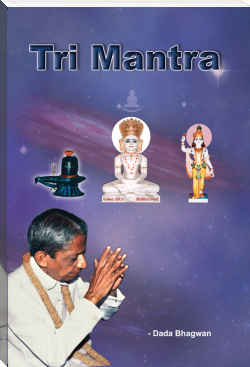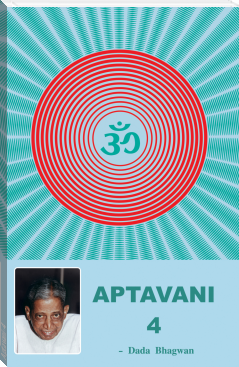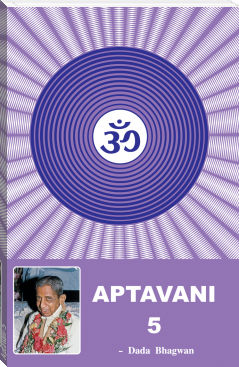Aptavani-2 - Dada Bhagwan (good ebook reader .TXT) 📗

- Author: Dada Bhagwan
Book online «Aptavani-2 - Dada Bhagwan (good ebook reader .TXT) 📗». Author Dada Bhagwan
Nature of religion (Dharma)
What is the definition of dharma (religion)?
That which reverts to its original nature (dharma) and then brings forth the result, is called religion. That means it takes hold within and decreases the kashaya (anger, pride, deceit and greed) within.
The nature of anger, pride, deceit and greed (kashaya bhaav) is such that they will not decrease. Rather, they keep increasing within. They will not decrease by one’s own efforts. They will decrease through religion (dharma) as defined above. Where will one attain such a religion? From a Gnani Purush. It should be a religion certified by the Gnani. Thereafter, use of just two words of the Gnani Purush, words that are laden with the energy that brings exact results (vachanbad), words that awaken and maintain awakened awareness (jagruti), will shatter the veils of ignorance to release tremendous energies from within.
That which brings forth results is religion (dharma). That which does not bring forth a result is not religion (adharma).
What is the result? Religion decreases one’s kashays. They become lighter, lesser and ultimately they leave. As they decrease and lessen, one’s inner energy and bliss increases. One becomes aware of the amazing inner energies that express. Where did all these energies come from? That is dharma (religion). If not, the spinning toy (term Dadashri uses for the plight of the human being who enters one life after the other by creating karmas through ignorance, the analogy being the spinning top which stops spinning at death) remains the same until the time of death (nanami). How can one call that religion?
What does it mean ‘to become the religion and then bring forth result’? What result is to be expected? Is it to learn how to take a vow, discipline, penance? No, none of these. It means to be rid of anger, pride, illusionary attachment, deceit and greed (kashays). To be rid of these kashays is called dharma (religion). Then some say, what about these daily introspective periods (samayiks), meditation sessions (dhyan), listening to discourses (pravachans)? Is that not religion? The Lord says, no that is not religion. The Lord advises you to ask these teachers of religion if they experience kashays with their disciples. The master will then reply that none of the disciples follow their instructions to do samayik and therefore they get very upset from within. Now, is that dharma? Are they following religion? No, on the contrary they are only increasing the kashays.
Religion does not exist in samayiks (introspection) etc. Religion exists in the expression of meaningful results. Religion means that which eradicate kashays and their intents. These kashaya bhaavs cannot be killed even if one tries to; they cannot be peeled away no matter how much one tries to do so. They are very resistant to eradication.
When the religion attains its final and full result, then one becomes the embodiment of religion (dharma swaroop).
Real Dharma : Relative Dharma
There are two types of dharma: relative and real.
Relative dharma encompasses workings of the mind, the speech, the body and all other activities of the non-self. Chanting mantras (japa) is the dharma of speech. Meditation is dharma of the mind. Bathing, performing religious rituals are the dharma of the body.
Everything remains within the parameter of its own dharma. The mind remains in the dharma of the mind, the intellect remains within its own dharma, the chit remains in the dharma of the chit, the ego remains in the dharma of the ego, the ears remain in the dharma of the ears. Ears do the work of listening; they are not involved in the action of seeing. The eyes perform the action of seeing and not listening. The nose is involved in the action of smelling, the tongue plays its role by tasting and the tactile sense is involved in the feeling of touch. Every sense is always involved in the function of its own subject matter (dharma).
When the mind is involved in its dharma, the mind may have good thoughts or bad thoughts but nonetheless, it is in its own dharma. When thoughts are good, one says, “My thoughts are good,” because of the illusion (bhranti). Here one becomes one with the thoughts (tanmayakar). When thoughts are negative, he remains separate from the thoughts saying, “I have these terrible thoughts even when I do not want to.” The function (dharma) of each component of the antah-karan (the internal functioning mechanism in every human being composed of the mind, the intellect, chit and ego) is separate. The function of the mind is separate, function of the chit is separate, function of the intellect is separate and function of the ego is separate. But one interferes in their functioning and creates a mess! To become one with thoughts is the illusion. When interference of becoming the owner of the thought ceases? It is when the Gnani Purush bestows the knowledge of the Soul; the knowledge of one’s real Self, one ceases to become one with everything that takes place within and without. As the Self, one becomes impartial. Then there will be no support for the mind, the chit, the intellect, the ego or the body. You become one with them because of the false projection (aropit bhaav) ‘I am the body’. Once you attain the Self, you remain separate as the knower and the seer.
Everyone in the world is practicing relative dharma. They are engaged in the dharma of the body, the speech and the mind. They believe the dharma of the mind to be their own dharma. True dharma is where one believes the Self to be the only dharma. All others are relative dharmas. Dharma of the Self is the only real dharma; that is the dharma of the Self (swadharma) and that is liberation (moksha). One needs to know dharma of the Self. All others are the dharmas of the non-self.
‘Dada Bhagwan’ within you is the living Lord. He is the absolute supreme Self (parmatma). This very Lord is fully manifested within me and within you, He has yet to manifest. Here there is no religion; here you have to get your work done. How long will you go on sitting in religious schools? All you have to do is to get your work done, by that ‘We’ mean you have to attain the knowledge of your Self from the Gnani Purush. The Gnani’s lamp is lit, all you have to do is touch the wick of your lamp to his, and your lamp too will be lit. Very rarely, only once in a while is there a presence of a Gnani Purush on this earth. A Gnani of the Akram path (the short-cut path to Self-realization) comes about once every million years, but when that happens, it is possible for you to realize your Self (Soul) within just one hour! And that is why ‘We’ are telling you to get your work done. This body is like a bubble, there is no telling when it may burst. Sitting within is Dada Bhagwan, he is the supreme Lord; his presence is magnificent and powerful. Therefore, people will achieve salvation as long as this ‘bubble’ exists. This is because the supreme Lord within is very pleased with me; the Lord of the three worlds (lokas) follows my wishes. The Lord does not have speech, neither does he have hands or feet and that is why he has surrendered to me and has made me an instrument (nimit) in this path of salvation of this world. And that is why ‘We’ are saying, “Get your work done as long as this bubble remains intact.”
Here, with me, the only dharma is the dharma of the Self. Here, there is only the path that is free of all contradictions. Elsewhere in the world, there is practice of relative religions. To make a false projection of being what you are not, to live as ‘I am Chandulal,’ to walk the path where good deeds are advocated and bad ones are denounced; to maintain an obliging nature towards everyone, even when it is done in the entire life, all that ultimately remains in the domain of the relative dharma. And here, if you practice the real dharma, if you realize the Self even for just a second; then there is liberation. The Lord has said that if you were to say, ‘I am the Self’, even just once after becoming the Soul, then you will get your work done. Otherwise, even if you keep repeating, ‘I am the Soul and the body and all its entanglements are not mine’, for a million life times, you will not gain anything. What does the Lord say? He says, ‘You believe you are Chandulal.’ This has also become your faith. Your faith is not broken. That belief or knowledge is not broken and neither is your conduct any different and if you say, ‘I am the Soul’, then you will never achieve liberation. How can you say you are the Soul when all the while you remain in the false belief of ‘I am Chandulal’? How can you say you are the Soul when you speak as if you are Chandulal? When the false projection of your knowledge and vision of being Chandulal are broken and you are placed in the right belief and knowledge (of being the pure Soul), only then is liberation possible.
What do the relative dharmas preach? They tell you to stop doing bad deeds and do good ones. Good deeds bind merit (punya) karma and bad deeds bind demerit (paap) karma. It is not possible to do only good deeds your entire life. If you call someone names, you create five rupees worth of demerit karma and if you do philanthropic work, you earn hundred rupees worth of merit karma. Your demerit karma cannot be subtracted from the merit karma. If that were possible, millionaires would not allow any demerit karmas to accumulate. They would spend their money to pay off their debts of demerit karma. But this is real justice. And therefore one has to suffer the consequences of whatever karma is unfolding. Merit karma will bring you happiness as it unfolds and when your demerit karma unfolds, you will find its fruits very bitter. You have no choice, but to taste the fruits of both kinds of karma. Lord says to plant the seed of the fruit you can afford to taste. If you want happiness, then plant seeds of merit karma and if you want unhappiness, then plant seeds of demerit karma; but both merit and demerit karma are relative dharma, they are not real. In real dharma, dharma of the Self, liberation from both merit and demerit karma is attained. Relative dharma will bring you material happiness and will help you towards the path of liberation, whereas real dharma will grant you liberation. Here, with me, you will attain the real dharma which will give you liberation directly. Only here you will experience the bliss of liberation. You will experience freedom from physical ailments (adhi), mental anguish (vyadhi) and miseries imposed upon you by others ( upadhi) and constantly experience the bliss of the Self (samadhi). Only here does the state of absolute easiness (nirakudata) exist. There are talks of the Self (atma) and the absolute Self (parmatma) here.
How can you do purusharth (true inner endeavor) without becoming a purush (the Self)?
A prominent professor once came to me. He harbored the notion ‘I know something’ and ‘I am doing some purusharth.’ ‘We’ asked him, “What do you do? What is your purusharth?” and he replied, “All my efforts are solely for the soul.” ‘We’ asked him, “How can you do purusharth without becoming





Comments (0)